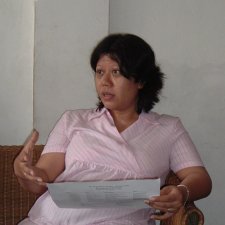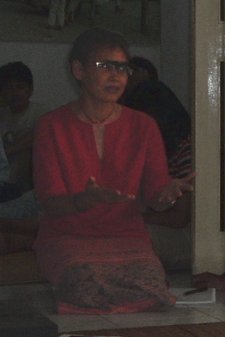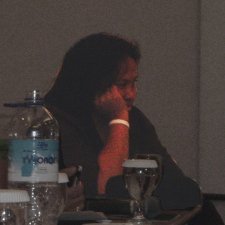Chicago
Indonesia is a Muslim country. Some estimates say 85% of the population shares the faith. There was not a morning I did not wake up to the call for prayers at 4:15 in the morning. Despite the secular cast of the country, many have asked about the role of women and the level of their subservience given the normal expectations of Muslin cultural impacts.
In a week of running across language and cultural barriers in two cities, the safest answer might be — “how could we really know?” Nonetheless, all of us with the Organizers’ Forum came away with a clear impression, and a surprising one, that the role of women was vibrant and central.
Even before we arrived, Barbara Bowen, our coordinator, commented to me several times that we certainly were running into a lot of women who were central parties to their organizations in the meeting setup phase, especially compared to Brazil, South Africa, and India, where our delegation would regularly get snappy with us about why we couldn’t find them more women to meet with in these country. That was not the case in Indonesia! Women were only there in the mix, but they were leading, speaking, presenting, and representing at every level. Women were around way too much to have just been for our benefit that is definitely for sure.
At one level there was the simple matter that women were running organizations. The oft mentioned case of the dynamic Wardah Hafidz with the Urban Poor Consortium is unavoidable. But we also met Dita Sari, who ran one of the more progressive union federations, which though less than 35000 members was clearly having an impact everywhere. Dita Sari had also earned national and international notoriety by refusing to accept an award (and cash!) from Reebok because of their practices on wages and women in Indonesia. We also spent a lot of time with Indah Budiarti, who now is the Public Services International country representative, but is widely believed to be one of the hopes of the Indonesian labor movement and a potential bridge to uniting in the future some of its scores of separate federations.
On another level the issues of women have become central to the political and social discourse of the country for several historical and economic reasons, which also make their formations and voices impossible to ignore.
The more recent historical reason is sad and tragic and speaks to a cultural correction that seems to include an elite and leadership investment in change. In the many days riots that brought down the Suharto regime which included student mobilizations, mass actions around fuel increases, and widespread national protests, one of the aberrant twists in these events was violence against women leading to the rapes of more than 100 women, largely of Chinese descent, in central Jakarta, including burning of buildings to cover the crimes. The new government met the demands and outrage of women by agreeing to some national soul searching, even if not reconciliation, and appointed a Commission Against Violence to Women. We met with two of the leaders of this group, including their general secretary, Kamala Chandrakirana, who were both forceful, articulate, and powerful advocates around these issues.
The economic issue which centers women in the national debate focuses on the role of women as part of the vast labor export market that is part of the fiscal reality of the country now. Exporting women to work as domestic workers is fraught with risks, even as it is a huge source of remittances and favorable economic balances. Indonesia has not come to the level of the Philippines in making this part of their economic engine, but it is approaching these levels in a largely unregulated way. The related issues of trafficking are right behind this. We met extensively with a women’s organization in Jakarta that was focused on these and other women’s issues, Solidaritas Perempuan (SP)/Women’s Solidarity for Human Rights and their primary director, Salma Safitri Rahayaan (“Fifi” as she called herself surprisingly!), Chair of the National Executive Body. We came away from several of these meetings depressed at the immensity of the job compared to the capacity to fight here, but that did not dampen our the clarity of women’s roles and leadership in these struggles.
The role of women as also central when we met with a number of the “civic forum” groups in both Yogya and Jakarta. One of the Muslim based civic forums in Jakarta, that was supported by the Ford Foundation and others extensively, included a healthy number of women in roles that were clearly central. The same was true of the Solo delegation from the civic forum there that met with us extensively in Yogya.
We may not have been able to get the whole story in our brief visit, but now that I’m back and adding up the pluses and minuses and trying to figure out, exactly what to take away from these incredible visits, I have to say that Indonesia might serve as an important model for Muslim countries on the contribution, role, and centrality of women in civic, labor, and community life. Perhaps they might serve as a model for more than just Muslim countries?
October 7, 2005
Kamala from Komnas Perempuan KP & National Commission Against Violence to Women
Solo Civic Form
Muslim Civic Forum
Dita Sari
Wardah Hafidz
Indah Budiarti


